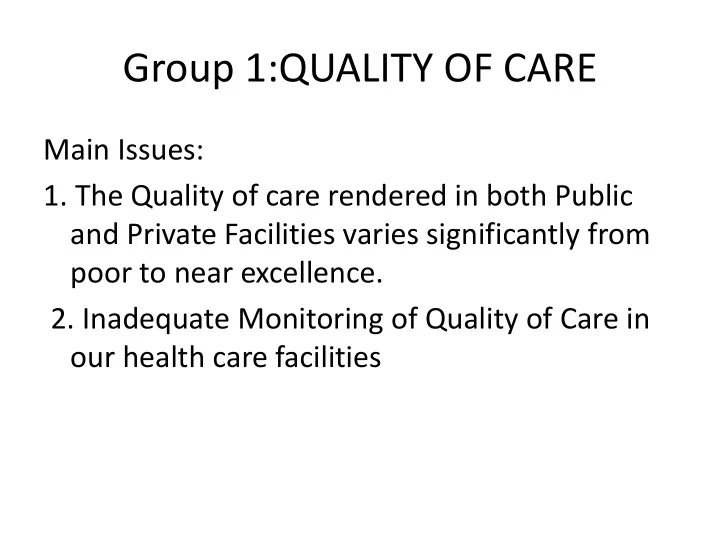

Group 1:QUALITY OF CARE Main Issues: 1. The Quality of care rendered in both Public and Private Facilities varies significantly from poor to near excellence. 2. Inadequate Monitoring of Quality of Care in our health care facilities
Group 1: QUALITY OF CARE ACTION 1. The creation of dedicated department and units in the Ministries of health with motivated staff to enforce standards/Quality of care 2. Enforcement of standards in training Institutions through strengthening of regulatory bodies and professional Associations Continue in-service training to up-date knowledge and skills 3. Staff exchange programme links with developed centres across the globe 4. The need to harmonize the existing tools for quality management in the country 5. Regular supervisory visits to the health institutions 6. Budgetary allocation, release and use of funds for purpose of quality improvement 7. Institutionalization of research including operation research to identify gaps and propose solution
Group 2:Connecting FH, RH and Maternal Health • The key is the provision of comprehensive integrated services/packages in all our health facilities, private sector inclusive • On the demand side the key issue identified is the family planning messaging and challenges of user fees • Reframe our FP messages into the context of its overall improved health benefits and complete elimination of user fees
Group 2: Supply side • Issues identified are lack of skilled health care providers, poor infrastructure, lack or infrequent stock out of commodities and poor translation of research findings into action. • Need an integrated package for training of HCW, efficient logistics system, community ownership of our services and provision of outreach services to reach remote communities. • Funding challenges • Full involvement of our traditional and religious leaders
Group 3: Poverty Issues Solutions A. Higher A. Macroeconomic policies that address high vulnerabilit poverty rate & provide social protection to the poor Job creation & poverty alleviation: support to y of the poor to ill- MSMEs, engagement of the private sector, more health functional educational curricula Improved infrastructure incld. Rural areas Pro-poor housing & environmental policies B. Poor health- B. Pro-poor policy in the health sector seeking Expand Conditional Cash Transfer programme behavior of Free maternal health policy (including FP) the poor Expand health insurance coverage Building social capital Social accountability Health education targeting vulnerable pple
Group 3: Culture & Societal Values Issues Solutions Education of A. Health-damaging gender norms: - Violence against women (VAW) individuals, households - Low priority of girl-child education & community Engagement of opinion - Girl-child marriage leaders & local B. Harmful maternal health practices: community leadership - Delivery practices: to deliver structures unaided or deliver at home, or with Behaviour change unskilled attendants (such as communication traditional birth attendants or Legal provisions & spiritual homes) enforcement (e.g. on - Family Planning: Cultural & religious VAW, child education, opposition & pronatalistic values & girl-child marriage)
Group 4: Knowledge gap & research findings Data (collection , reporting analysis & funding) Recommendations: • Develop a mechanism for collecting maternal health data from every delivery points (unorthodox & orthodox). • Institute mechanism for enforcing regular reporting • Develop simple tools with Minimum indicators for data collection at community and PHC levels e.g. community information board. • Promote reporting via mobile platform • Develop and cost M&E plan at all levels ( NHB)
Group 4: Knowledge gap & research findings Inadequate implementation of research findings and social accountability. Recommendations: • Involve government in research projects development. • Articulate political and developmental implications/ benefits of research findings for policy makers use. • Community enlightenment and empowerment (social accountability).
Recommend
More recommend